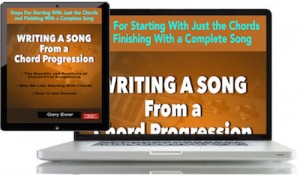I tweeted earlier today about an excellent interview with Peter Gabriel, “Life Lessons From a Rock Star.” I highly recommend you give that video a watch, as Peter, interviewed by philosopher Alain de Botton, discusses, at least in part, the notion of meaning in music.
One of the first questions from Alain de Botton:
What is it that you think that enables music to carry so much meaning… but at the same time meaning that we find hard to define? It just exists in its own medium?
I’ve often wondered this myself. It still amazes me that that one song might pack such a punch and be filled with meaning, and yet the specifics of that meaning might be completely different for individual listeners.
Peter’s answer is very insightful – to paraphrase, he offers that music taps directly into our emotional being, with none of the filtering and interpretation that our brain normally engages in when encountering the world around us.
 If you consider yourself more of a chords-first songwriter, get Gary’s eBook, “Writing a Song From a Chord Progression“. It describes the pros and cons of starting a song with the chords, and gives you a useful set of procedures for getting the job done. READ MORE
If you consider yourself more of a chords-first songwriter, get Gary’s eBook, “Writing a Song From a Chord Progression“. It describes the pros and cons of starting a song with the chords, and gives you a useful set of procedures for getting the job done. READ MORE
Do you ever sit and wonder what impact your own songs are having on your audience? It’s the holy grail of the mission of being a composer: you see the power of your music reflected in the eyes of your listeners. And you likely don’t even care at that point specifically what they’re feeling. Just the fact that you’ve been able to reach inside someone and make them feel anything is what it’s all about.
The reason why different people will feel different things, find different meanings, and have completely different experiences when listening to music is that every listener has their own backstory. Your song about your love for someone will be heard by people who are themselves in a loving relationship, but also by people who have just broken up with someone. Their reaction to your song, and the meaning they pull from it, will differ considerably.
And those are circumstances that you cannot control. You can insert your own meaning into your music, but ultimately the experiences of the listeners, and the meaning that they pull out of your music, are what really count.
You might think that songs with lyrics have the meaning clearly indicated. Lyrics, after all, tell us what the song is about. But that is the beauty of music. You can set happy lyrics to slow, brooding music, and happiness turns to melancholy.
You can take a sad story and pump up the rhythm and tempo, and sadness turns to resolve and strength.
Writing your song, in other words, is just half of the equation. The rest of the story — what you do in the studio to get that song ready for public consumption — can have a tremendous impact on the audience. It’s why hiring a professional producer can be such an important step to your success as a performing songwriter.
Even though everyone’s experience with your songs will differ, it is well worth the time to sit and listen objectively to what you’ve written and recorded, and focus on what you have done to make certain emotions step forward. Think about how your musical arrangement is affecting musical meaning.
And it may be most revealing if you find that it’s hard to pick up any meaning at all from your songs. Because if all you’ve done is written 3-and-a-half minutes of “good music”, you might be wasting your audience’s time.
There needs to be a good answer to “Have I written something that an audience will have an emotional reaction to?”
 Written by Gary Ewer. Follow Gary on Twitter.
Written by Gary Ewer. Follow Gary on Twitter.
 “The Essential Secrets of Songwriting” eBook Bundles cover every aspect of songwriting technique. How to write better melodies, chord progressions, lyrics, and more. The bundle packages contain hundreds of chord progressions you can use as is, or modify as you see fit.
“The Essential Secrets of Songwriting” eBook Bundles cover every aspect of songwriting technique. How to write better melodies, chord progressions, lyrics, and more. The bundle packages contain hundreds of chord progressions you can use as is, or modify as you see fit.











Pingback: The Soulful Strings – Within You Without You | mostly music